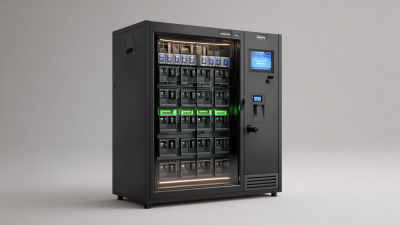Understanding the Importance of Intelligent Key Management Systems in Modern Security
Table of Contents
- The Role of Intelligent Key Management in Cybersecurity Strategies
- Benefits of Automated Key Management for Businesses
- Best Practices for Implementing Key Management Systems
- Common Challenges in Key Management and How to Overcome Them
- Future Trends in Intelligent Key Management Solutions
- Integrating Key Management with Other Security Technologies
- FAQS
- Conclusion
- Related Posts
In today's rapidly evolving security landscape, the significance of an Intelligent Key Management System cannot be overstated. As organizations strive to protect their assets and ensure operational efficiency, the management of physical and digital keys has become a critical concern. Beijing Landwell Electron Technology Co., Ltd. recognizes this need by offering simple and flexible solutions that empower businesses to maintain complete control and oversight of their key usage. With an Intelligent Key Management System, companies can not only secure their environment but also enhance accountability and streamline their operations. This blog delves into the vital role of Intelligent Key Management Systems in modern security, showcasing how Landwell's innovative solutions can contribute to a safer, more organized workspace.

The Role of Intelligent Key Management in Cybersecurity Strategies
In a landscape where cyber threats are increasingly sophisticated, intelligent key management systems (IKMS) are becoming a cornerstone of robust cybersecurity strategies. As organizations adopt Industry 4.0 frameworks characterized by interconnected devices and extensive data exchanges, the need for advanced key management practices becomes paramount. A systematic literature review emphasizes how digital twins can significantly enhance security in these applications by simulating real-world conditions, allowing organizations to anticipate and mitigate potential vulnerabilities effectively. This proactive approach solidifies the role of IKMS in protecting sensitive data across networks that are more exposed than ever.
Moreover, as cyber resilience takes center stage in 2024 and beyond, intelligent key management is critical for safeguarding distributed energy resources and smart grids. Findings indicate that the integration of renewable energy sources adds layers of complexity to cybersecurity, making intelligent key management essential. Networks must segment their perimeters and utilize multiple intelligent defenses to address cyber-physical threats effectively. By leveraging knowledge from current technology surveys that highlight the challenges and opportunities in smart manufacturing, organizations can re-evaluate their cybersecurity frameworks to ensure that IKMS not only protect critical keys but also enhance overall operational security.
Understanding the Importance of Intelligent Key Management Systems in Modern Security
| Aspect | Description | Importance in Cybersecurity |
|---|---|---|
| Data Encryption | The process of encoding data to prevent unauthorized access. | Critical for protecting sensitive information and ensuring compliance with regulations. |
| Access Control | Mechanisms that restrict access to systems and data to authorized users only. | Essential for preventing unauthorized access and data breaches. |
| Audit and Logging | Tracking and recording of activities in the system for accountability. | Vital for identifying discrepancies and responding to security incidents. |
| Key Lifecycle Management | The process of creating, distributing, storing, and disposing of cryptographic keys. | Crucial for maintaining the integrity and security of encryption methods. |
| Compliance Management | Ensuring that security practices meet regulatory and industry standards. | Important for avoiding legal penalties and enhancing organizational reputation. |
Benefits of Automated Key Management for Businesses
In the rapidly evolving landscape of security, automated key management systems (KMS) are proving to be indispensable for businesses. Unlike traditional methods, which are often time-consuming and prone to human error, automated solutions streamline the key management process, enhancing both efficiency and security. With integrated systems, organizations can monitor access and usage in real time, ensuring that sensitive data remains protected from unauthorized access.
Tip: Implementing a user-friendly automated KMS can significantly reduce the learning curve for employees. Choose a system that offers clear interfaces and training resources to empower your team to manage keys effectively.
Moreover, automated key management greatly reduces the risk of lost or mishandled keys. By utilizing encryption and centralized control, businesses can maintain tight security protocols while also simplifying audits and compliance reporting. This not only protects an organization’s assets but also fosters a culture of accountability and responsibility.
Tip: Consider regular reviews and updates of your KMS protocols to adapt to new security threats. Keeping the system agile allows your business to respond promptly to emerging challenges, thereby safeguarding your critical resources.
Best Practices for Implementing Key Management Systems
In the rapidly evolving landscape of cybersecurity, the implementation of Intelligent Key Management Systems (KMS) has become paramount for organizations aiming to safeguard their assets. According to a report by Gartner, 75% of security breaches result from improper key management practices. This statistic underlines the necessity of robust key management frameworks that not only secure sensitive information but also ensure compliance with industry regulations.

Best practices for implementing a KMS include a thorough risk assessment, regular audits, and the use of encryption technologies. Organizations must consider implementing solutions that provide automated key rotation, granular access control, and comprehensive logging capabilities. Companies like Beijing Landwell Electron Technology Co., Ltd. are at the forefront, offering flexible solutions tailored for diverse environments. Their systems empower organizations with complete control and oversight of key usage, ultimately reducing the risk of unauthorized access and enhancing overall security posture.
Furthermore, it is essential to educate employees about key management protocols and the potential impacts of key mismanagement. As the cybersecurity landscape continues to evolve, investing in a sophisticated KMS is not merely a recommendation; it is an imperative that directly correlates to an organization’s integrity and success in the face of growing security threats.
Common Challenges in Key Management and How to Overcome Them
In the evolving landscape of modern security, effective key management remains a pivotal challenge as organizations grapple with numerous risks associated with sensitive data access. Intelligent Key Management Systems (IKMS) offer solutions to these hurdles by automating and securing the distribution, storage, and usage of cryptographic keys. With an increase in regulations and the sophistication of cyber threats, organizations must adopt advanced IKMS to streamline compliance processes and mitigate risks. These systems not only enhance operational efficiency but also bolster the organization’s overall security posture by providing robust access controls and audit trails.
Nonetheless, several common challenges persist in the realm of key management, including operational complexities and the need for integration with existing security frameworks. Organizations often face difficulties in ensuring that all key components are consistently monitored and maintained. Investing in a centralized management platform can help overcome these obstacles by offering a holistic view of key usage and security metrics. Furthermore, training staff and fostering a culture of security awareness are vital steps in ensuring the effective implementation of an IKMS, enabling organizations to protect their sensitive information while navigating the complexities of modern security threats.

Future Trends in Intelligent Key Management Solutions
As organizations evolve in an increasingly digital landscape, the significance of Intelligent Key Management Systems (IKMS) cannot be overstated. With the global AI image recognition market projected to reach a staggering $22.273 billion by 2025 and grow to $63.4907 billion by 2033, the demand for sophisticated security measures is paramount. The integration of intelligent key management not only fortifies security protocols but also enhances the efficiency of data protection, paving the way for future innovation.
Moreover, the quantum encryption market is experiencing significant growth, with various segments such as quantum key distribution and quantum random number generation positioning themselves as critical components of cybersecurity. As organizations transition towards multi-cloud and hybrid architectures, the necessity for a robust key management solution becomes a priority. The Gartner Top 10 Strategic Technology Trends for 2025 highlight the importance of responsible innovation, indicating that adopting intelligent key management systems will be essential for organizations looking to secure their operations amidst evolving threats.
As companies prioritize safeguarding sensitive information across various platforms—including application security, network security, and cloud security—investing in intelligent key management solutions will be crucial for staying ahead in a competitive landscape. With ongoing technological advancements and an eye towards future trends, the strategic implementation of KI systems will define the modern security framework.
Integrating Key Management with Other Security Technologies
In today's rapidly evolving security landscape, integrating intelligent key management systems (KMS) with other security technologies is essential for comprehensive protection. By leveraging advanced key management solutions, organizations can not only maintain control over their cryptographic keys but also enhance their overall security posture. For instance, integrating KMS with identity and access management (IAM) systems allows for automated lifecycle management of keys, ensuring that only authorized users have access to sensitive data. This synergy significantly minimizes the risk of data breaches and insider threats, as key access is closely monitored and regulated.
Moreover, the integration of key management with security information and event management (SIEM) systems provides organizations with real-time monitoring and incident response capabilities. By correlating key access events with security alerts, businesses can quickly identify anomalies and respond to potential threats before they escalate. This proactive approach to security not only improves the efficiency of incident response but also instills a greater sense of trust among stakeholders, knowing that robust encryption and key management practices are in place to safeguard their information assets. As threats evolve, the versatility of integrated security technologies will be crucial in defending against increasingly sophisticated attacks.
Integration of Intelligent Key Management Systems with Other Security Technologies
FAQS
: An automated key management system (KMS) is a technology that streamlines the process of managing encryption keys, enhancing both efficiency and security for businesses compared to traditional methods.
Automated KMS improves security by allowing organizations to monitor access and usage of keys in real time, thus protecting sensitive data from unauthorized access.
A user-friendly automated KMS can reduce the learning curve for employees, making it easier for them to manage keys effectively, thereby enhancing overall security and operational efficiency.
Automated key management uses encryption and centralized control to reduce the risk of lost or mishandled keys, which helps maintain tight security protocols and simplifies audits.
Regular reviews and updates of KMS protocols are essential to adapt to new security threats, allowing businesses to respond promptly to emerging challenges and safeguard critical resources.
Future trends include the growth of the AI image recognition market and the emergence of the quantum encryption market, which highlight the necessity for advanced key management solutions in a digital landscape.
Intelligent Key Management Systems (IKMS) enhance security protocols and increase data protection efficiency, making them crucial for organizations in light of evolving cybersecurity threats.
As organizations transition to multi-cloud and hybrid architectures, the need for robust key management solutions becomes critical to ensure the security of sensitive information across various platforms.
Responsible innovation is essential for adopting intelligent key management systems, which will be necessary for organizations to secure their operations against evolving threats.
Investing in intelligent key management solutions helps businesses stay competitive by safeguarding sensitive information, improving security measures, and adapting to ongoing technological advancements.
Conclusion
In the modern landscape of cybersecurity, the implementation of an Intelligent Key Management System is essential for safeguarding sensitive information and assets. These systems play a crucial role in cybersecurity strategies by automating key management processes, which significantly enhances operational efficiency for businesses. By adopting such automated solutions, organizations can achieve greater oversight and control over key usage, mitigating risks associated with human error and potential breaches.
However, implementing an Intelligent Key Management System is not without its challenges. Common issues include integration with existing security technologies and ensuring compliance with industry standards. To address these challenges, businesses should adopt best practices such as conducting thorough assessments, providing training for staff, and staying informed about future trends in key management. As companies like Beijing Landwell Electron Technology Co., Ltd. demonstrate, adopting simple and flexible key management solutions can lead to improved security and streamlined operations in various environments.
Related Posts
-

Digital Best Practices for Implementing an Effective Key Management System
-

Understanding the Essentials of a Physical Key Management System: A Comprehensive Guide
-

5 Essential Tips for Choosing the Best Fingerprint Key Locker for Your Business
-

Ultimate Guide to Using a Key Cabinet With Card Reader for Enhanced Security
-

Ultimate Guide to Choosing a Smart Key Management Cabinet: Key Trends & Industry Insights for Global Buyers
-

Choosing the Best Key Locking Organizer for Your Needs a Comprehensive Comparison Guide
Blog Tags:

